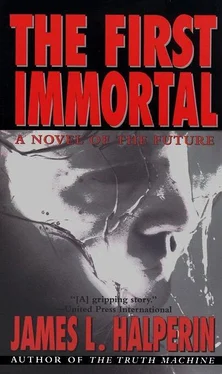“Where have I heard that rationalization before?”
“Well, damn me to hell! I’m not turning into another Herbie Rainwater, am I? Fact is, Gary, I like the job, compromises and all. And we did get a watered-down assisted-suicide bill through.”
“True enough,” Gary teased, sarcasm dripping from his words like maple syrup off a short stack, “a very valuable concession indeed to those wishing to legally end their lives—after the standard six-month approval process for a permit, while cancer eats their brains or unbearable pain racks their bodies.”
George grimaced, then smiled. “Touché!”
Gary’s face turned serious. All of a sudden he could see Katie, Alice, even Ben, resting quietly in the back of his mind. And whenever he pictured them lying in canisters of liquid nitrogen, he saw a fourth, vacant canister: the one meant for him. “What’s gonna happen with all this?” he asked.
George did not have to ask what his uncle meant. “Believe it or not, I think the long-term dynamics might be in our favor. Not the party’s, of course; we Democrats are in deep doodoo. But Kevorkianism will gain momentum, which can only help cryonics.”
“How?”
“Right now, about fourteen percent of Americans say they intend to be frozen. That’s a big increase over the last few years, but still a meager number if you relate it to policy. There are five major reasons why most people say they won’t do it.”
“Fear of the unknown being the most intractable,” Garry speculated, once again glimpsing the empty ice canister at the back of his mind.
“Don’t know. It may be right up there, but nobody ever owns up to that one. The five reasons people admit to are cost, scientific uncertainty, social disapproval, religious beliefs, and philosophy. In that order. Of course, if we’re ever able to restore a mammal—even a sewer rat—after a decent interval of liquid nitrogen immersion, well, then everything changes. All the politics or rational cajoling in the world can’t compare with an empirical result.”
Obviously true, Gary thought.
“So until that happens,” George continued, “—and notice I said until, not if—lower costs become our most effective persuasion. If suicide is legalized, and I mean really legal as opposed to bullshit legal, cryonics’ll become cheaper. Most of the expense right now is red tape. Liquid nitrogen’s inexpensive and plentiful. Maintenance and storage cost is next to nothing, not much more than mowing and watering the grass at a cemetery. Theoretically, cryonics shouldn’t cost more than a decent funeral does. Lower the price to what it should be and you’ll increase demand by at least three hundred percent. Bigger market creates more competition and better research, which leads to public acceptance and even more demand. A real snowball effect.”
“How do you figure the outlook’s improving for Kevorkianism?” Gary asked. “Seems like the religious groups are putting up a hell of a fight. To them, one life’s worth the same as any other, whether it belongs to a senator, fetus, death-row inmate, or terminal patient. They’re picketing courthouses, surrounding all the capital execution facilities twenty-four hours a day, harassing the few doctors still willing to practice obitiatry, and assassinating judges and prosecutors. It’s as bad as the abortion fight ever was.”
George shrugged. “These are turbulent times. Let’s face it, Swift and Sure is having a rough first year; executions are running way over President Hall’s original projections. But I figure by this time next year most of the hard-core violent criminals are gonna be six feet under. Crime rates’ll plummet; so will the number of executions, and the protesters’ll have to find something else to complain about.”
“Yeah. Kevorkianism.” Gary always enjoyed playing devil’s advocate.
“Maybe so, but the Republicans’ approval ratings should exceed sixty percent for the next few presidential terms.”
“How in hell does that help us?”
“If I’m right, the GOP won’t screw it up this time; learned their lesson in 1996 and 2000. This time they’re gonna consolidate their power by hugging the middle; ditch the Christian right like a bad habit. Won’t need ‘em anymore. And that, Uncle Gary, is very good for us.”
November 30, 2006
—Intuit stock plunges for the third day in a row, as the software and banking behemoth remains unable to assure the markets against a repeat of last week’s corporate terrorism. For 38 hours, a virus unleashed into one of Intuit’s central data processors interrupted the financial services of nearly ten percent of North Americans. With the perpetrators still at large, the company’s market capitalization has now declined by 31%, or almost $135 billion. The Department of Justice is rumored to be questioning parties with short positions in Intuit stock.—Memorial services are held in churches throughout the world in remembrance of the estimated 1.2 million lost in the nuclear incinerations at Sarajevo in May, and Baghdad in September. Interpol continues to investigate leads but admits having no suspects. The two horrific crimes still appear to have been unrelated.—Ten days after scientists in France revived a cryonically frozen mouse, Fidelity Investments, the Boston mutual fund and stock brokerage giant, offers Cryonic Trust Accounts that conveniently combine suspension life-insurance and trusteeship. CTAs assure those enrolled with cryonics organizations that their suspension-funding will be in place when the time comes to be frozen, and that their capital will be prudently managed for optimal after-tax growth until their possible revival. Fidelity reports opening 712,432 new accounts, a record for any 24-hour period.
Toby shook his head. “Amazing. Two cities blown off the face of the earth, and months later, nobody has a clue why. Or who’s responsible.”
Having just completed one of their thrice-weekly thirty-five-minute cybernetic strength-training routines, the two men relaxed at the juice bar of the Boston Fitness League, sitting in a private booth and sipping individually formulated replenishment tonics. “Makes you wonder,” Gary said, “if the second law of thermodynamics doesn’t predict the future. You know, entropy increases overtime…”
Toby considered the vivisected metaphor and smiled. “Exactly! Matter of fact, that’s why I chose my second career. Any closed system suffers ever-increasing disorder and will ultimately decay and die. Nature—including our own human nature-is the enemy of all living creatures, except…”
“Except…?”
“Except when intellect is introduced. At least that’s my theory. Physics itself would dictate that the human race will eventually become extinct. But physics can’t account for higher intelligence and rational thought. I believe science will either save the human race if we respect its tenets—including those that apply to our own nature—or destroy us if we ignore them.”
“But how do you persuade people to reject the appeal of mysticism? After all, mysticism is easy; science is hard.”
“I don’t know. I couldn’t seem to make much of a dent in it.” Toby scowled and shook his head. Then his eyes seemed to brighten. “But faster and cheaper computers should help, and as information expands, so must our ability to evaluate it. Maybe the free market could contribute, too, by rating scientific opinions for money. But artificial intelligence is the real deal, Gary. Software’s already the most important industry on earth, and within a few decades we’re bound to have artificial intelligence far more advanced than our own minds. Our imaginations may well be limitless, but next to today’s machines, our ability to compute and evaluate facts is a joke. And if you think technology’s moving fast now, just wait till AI arrives. If machines could learn to sort the clear, objective data from self-serving and muddled science, that would be a leap to boggle the senses.”
Читать дальше












